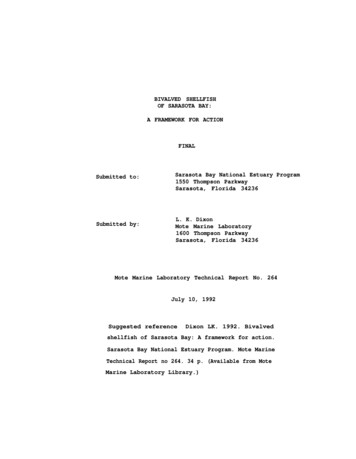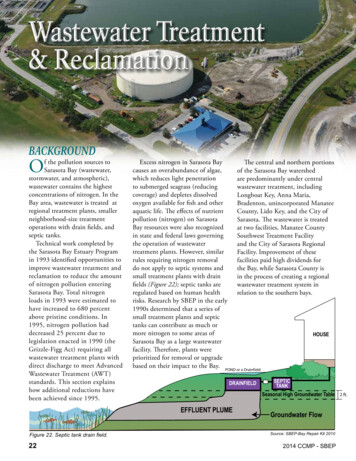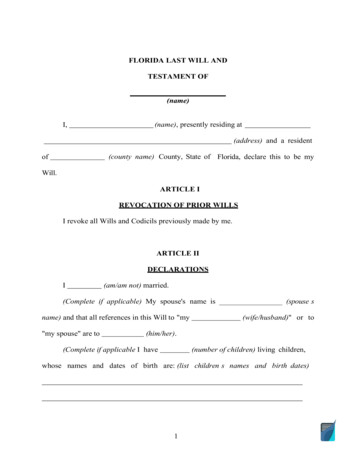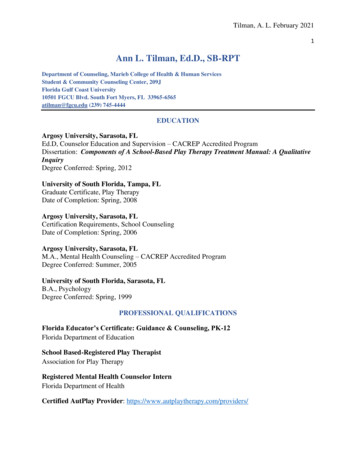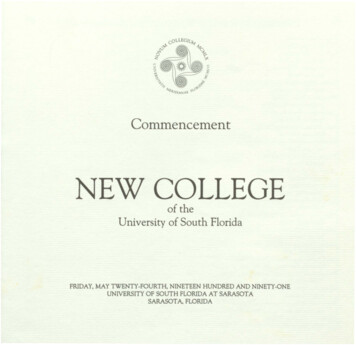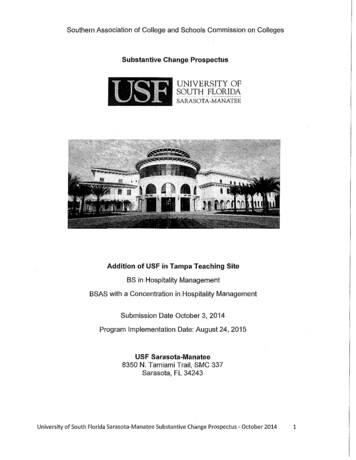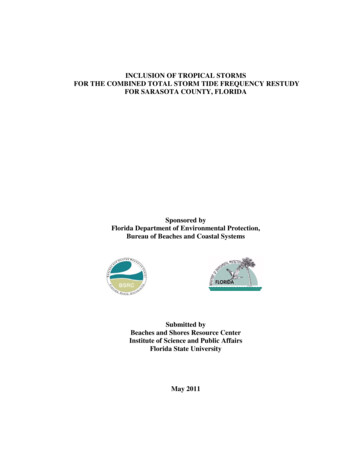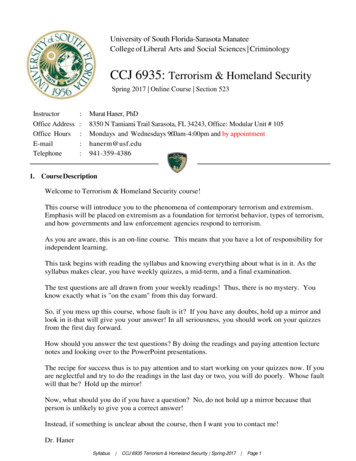
Transcription
University of South Florida-Sarasota ManateeCollege of Liberal Arts and Social Sciences CriminologyCCJ 6935: Terrorism & Homeland SecuritySpring 2017 Online Course Section 523InstructorOffice AddressOffice HoursE-mailTelephone:::::Murat Haner, PhD8350 N Tamiami Trail Sarasota, FL 34243, Office: Modular Unit # 105Mondays and Wednesdays 9:00am-4:00pm and by appointmenthanerm@usf.edu941-359-43861. Course DescriptionWelcome to Terrorism & Homeland Security course!This course will introduce you to the phenomena of contemporary terrorism and extremism.Emphasis will be placed on extremism as a foundation for terrorist behavior, types of terrorism,and how governments and law enforcement agencies respond to terrorism.As you are aware, this is an on-line course. This means that you have a lot of responsibility forindependent learning.This task begins with reading the syllabus and knowing everything about what is in it. As thesyllabus makes clear, you have weekly quizzes, a mid-term, and a final examination.The test questions are all drawn from your weekly readings! Thus, there is no mystery. Youknow exactly what is "on the exam" from this day forward.So, if you mess up this course, whose fault is it? If you have any doubts, hold up a mirror andlook in it-that will give you your answer! In all seriousness, you should work on your quizzesfrom the first day forward.How should you answer the test questions? By doing the readings and paying attention lecturenotes and looking over to the PowerPoint presentations.The recipe for success thus is to pay attention and to start working on your quizzes now. If youare neglectful and try to do the readings in the last day or two, you will do poorly. Whose faultwill that be? Hold up the mirror!Now, what should you do if you have a question? No, do not hold up a mirror because thatperson is unlikely to give you a correct answer!Instead, if something is unclear about the course, then I want you to contact me!Dr. HanerSyllabus CCJ 6935 Terrorism & Homeland Security Spring-2017 Page 1
1.1 PrerequisitesThere are no prerequisites for this course. However, you must be a responsible independentlearner!1.2 Credit HoursThree (3) credit hours.2. Course FormatSince this is an online course, Canvas will be used for all kinds of communication. I will beposting ALL the course material on Canvas so check the tabs (e.g., Readings). I also willpost ALL announcements, including changes in the course schedule, in Canvas. I use youremail address registered in Canvas to communicate with you. Please make sure your emailaddress is correct. It is each student’s responsibility that his/her email address is correct andto make sure he/she gets information posted on Canvas.3. Required TextUnderstanding Terrorism: Characteristics, perspectives, and issues. Gus Martin (Fifth Edition)ISBN: 978-1-4833-7898-5. Thousand Oaks, CA: Sage Publications4. Learning OutcomesUpon completion of this course, the student will be able to:1) Understand terrorism in historical and social contexts2) Understand the major national and ethnic terrorism3) Learn about the ideological and religious movements4) Learn to think critically about domestic terrorism and homeland securitySyllabus CCJ 6935 Terrorism & Homeland Security Spring-2017 Page 2
5. Course ObjectivesThe primary goal of this course is to give you an understanding of the motives, origins, andrationales for extremist beliefs and terrorist behavior, as well as how governments respond to thesephenomena. You will be challenged to critically assess extremist ideology and the practice ofterrorism. You will also be challenged to evaluate the notion that the practice of terrorism is limitedexclusively to the "lunatic fringe" - indeed, is one person's terrorist another person's freedomfighter?****To facilitate achieving these objectives, students are required to read the assigned materials,engage in application assignments, and complete a final test which brings all the topics together.6. Course RequirementsYour grade in this course will be based on a series of weekly tests, DB questions, midtermexam, and a final exam. The weekly tests will require application of the reading materialsfrom that week’s chapter.6. 1. Weekly Quizzes (42% of the final grade)There will be a total of 14 quizzes. Each quiz is worth 3% of your final grade and contains acombination of multiple choice, true false, and short answer questions. The tests will cover allthe material in the readings.6. 2. Discussion Board Questions (30% of the final grade)You are expected to post to discussion boards just as you would be expected to participate in aphysical classroom. There will be 10 DB questions. Citations are not required in DB posts. Theposts are due by 11:59 PM EDT on Saturday for the modules specified in the syllabus.6. 3. Mid-Term Exam (13% of the final grade) February 27th.The mid-term exam is worth 13% of your final grade and contains a combination of multiplechoice, true false, and short answer questions from the material covered between week 1 and 7.6. 4. Final Exam (15% of the final grade) May 1st.The final exam is worth 15% of your final grade and contains a combination of multiple choice,true false, and short answer questions from the material covered between week 8 and 14.***** If Canvas encounters any problems (e.g., crashes) while you are taking the weeklyquizzes, or exams, email me ASAP. Not to worry, we will solve the problem. Just in caseSyllabus CCJ 6935 Terrorism & Homeland Security Spring-2017 Page 3
canvas has a problem, you should write down your answers on a piece of paper so when wereset your quiz, you will have some of the answers.You can use your readings to complete the quizzes and exams, but you will be timed in Canvasonce you open and start the quiz; once the time is up you will be locked out of quiz. Use timemanagement skills. No additional time will be given to take the quiz (see for exception specialneeds policy below). Be sure to read the assigned readings for each week at least once beforeattempting that weekly quiz.6.5 Grade DistributionThe total points will be distributed in the following manner:(1) Weekly quizzes (56 %)(2) Mid-Term Exam (22 %)(3) Final Exam(22 %)Total1006.6 Grading ScaleThe following scale will be used to determine each student's final grade in the course: 96%A 77 - 79%C 93 - 95%A73 - 76%C90 - 92%A 70 - 72%C 87 - 89%B 67 - 69%D 83 - 86%B63 - 66%D80 - 82%B 60 - 62% 59%DF7. Course Policies7.1. Deadlines and late work: It is not acceptable to miss any assignment or turn in lateassignments. Canvas time stamps when an assignment is uploaded so be mindful of the DUE DATEand TIME listed on each assignment.7.2. Special Needs Policy: If you have any special needs related to your participation in thiscourse, including identified visual impairment, hearing impairment, physical impairment,communication disorder, and/or specific learning disability that may influence your performance inthis course, you should meet with the instructor to arrange for reasonable provisions to ensure anequitable opportunity to meet all the requirements of this course. At the discretion of the instructor,some accommodations may require prior approval by Disability Services.Syllabus CCJ 6935 Terrorism & Homeland Security Spring-2017 Page 4
7.3. Student obligations to academic integrity: All students are expected to uphold the Universityof South Florida Academic Integrity Policy and refrain from all forms of academic deceit. You mustact with honesty and integrity, and must respect the rights of others in carrying out all academicassignments. Exams for this class must be taken individually. Group or collaborative exams areprohibited and are considered CHEATING. Printing copies of the exam and/or any of the questionsand providing the information to other students is also considered CHEATING. The complete USFAcademic Integrity policy can be found tyofstudents.pdf7.4. Contacting Me: The best way to contact me is through email. I check my email multiple times aday, so you should receive a response from me within a few hours. On the other hand, please extendthe same courtesy to me. If I email you, please respond to me in a timely manner. It is very importantto check your USF email on a regular basis as important class information (e.g., class cancellationsand changes in the syllabus) will be relayed via email. If you do not have regular access to email,please let me know. You also can make an appointment to talk with me in my office on campus.7.5. Academic Support Services: The Information Commons provides students with individual andgroup study spaces, computers, printers, and various media equipment for temporary use. TheInformation Commons is staffed by librarians, learning support faculty, tutors, and technology and elearning specialists. Students challenged by the rigors of academic writing, mathematics, or othercourse content are urged to contact their professors early in the semester to chart out a plan foracademic success, and/or regularly use the tutoring services provided by Learning Support Services,which are provided at no cost to students.If you have questions concerning any of the course policies, you must email me during the firstweek of the course. If not, I will assume that you are clear about the policies and have agreedto abide by them. Thank you!8.USF System Policies8.1. Academic Dishonesty: The University considers any form of plagiarism or cheating onexams, projects, or papers to be unacceptable behavior. Please be sure to review the university’spolicy in the USFSM Catalog, the USF System Academic Integrity of Students, and the USFSystem Student Code of Conduct.8.2. Academic Disruption: The University does not tolerate behavior that disrupts the learningprocess. The policy for addressing academic disruption is included with Academic Dishonesty inthe USFSM Catalog, USF System Academic Integrity of Students, and the USF System StudentCode of Conduct.8.3. Disabilities Accommodation: Students are responsible for registering with the Office ofStudents with Disabilities Services (SDS) in order to receive academic accommodations.Syllabus CCJ 6935 Terrorism & Homeland Security Spring-2017 Page 5
Reasonable notice must be given to the SDS office (typically 5 working days) foraccommodations to be arranged. It is the responsibility of the student to provide each instructorwith a copy of the official Memo of Accommodation. Contact Information: DisabilityCoordinator, 941-359-4714, disabilityservices@sar.usf.edu, http://usfsm.edu/disability-services/8.4. Religious Observances: USFSM recognizes the right of students and faculty to observemajor religious holidays. Students who anticipate the necessity of being absent from class for amajor religious observance must provide notice of the date(s) to the instructor, in writing, by thesecond week of classes. Instructors canceling class for a religious observance should have thisstated in the syllabus with an appropriate alternative assignment.8.5. Protection of Students against Discrimination and Harassment:a) Sexual Misconduct/Sexual Harassment Reporting: USFSM is committed to providingan environment free from sex discrimination, including sexual harassment and sexual violence(USF System Policy 0-004).b) Other Types of Discrimination and Harassment: USFSM also is committed to providingan environment free from discrimination and harassment based on race, color, marital status,sex, religion, national origin, disability, age, genetic information, sexual orientation, genderidentity and expression, or veteran status (USF System Policy 0-007).The Counseling and Wellness Center is a confidential resource where you can talk aboutincidents of discrimination and harassment, including sexual harassment, gender-basedcrimes, sexual assault, stalking, and domestic/relationship violence. This confidential resourcecan help you without having to report your situation to other offices unless you request thatthey make a report.Please be aware that in compliance with Title IX and under the USF System Policy, educatorsmust report incidents of discrimination and harassment, including sexual harassment, genderbased crimes, sexual assault, stalking, and domestic/relationship violence. If a studentdiscloses any of these situations in class, in papers, or to a faculty member personally, he orshe is required to report it to OSSR or DIEO for investigation. Students who are victims orwho have knowledge of such discrimination or harassment are encouraged to report it toeither OSSR or DIEO. The Deputy Coordinator for USFSM is Allison Dinsmore, Coordinatorof Disability Services & Student Advocacy, #941-359-4714 or adinsmore1@sar.usf.edu.Campus Resources:Counseling Center and Wellness Center 941-487-4254Victim Advocate (24/7) 941-504-8599List of off-campus resources:HOPE Family Services: 941-755-6805Safe Place & Rape Crisis Center (SPARCC) – Sarasota: 941-365-1976First Call for Help- Manatee & Sarasota: 941-366-5025Cornerstone: 941-782-4800; 24-hr Hotline 941-708-60598.6. Web Portal Information: Every newly enrolled USF student receives an official USF email account. Students receive official USF correspondence and Canvas course information viathat address. The web portal is accessed at http://my.usf.edu.Syllabus CCJ 6935 Terrorism & Homeland Security Spring-2017 Page 6
9. Canvas UseThe class syllabus is posted in Canvas, an online course management system. Since this is anonline course, Canvas will be used for all kinds of communication. I will be posting ALL thecourse material on Canvas so check the tabs (e.g., Readings). I also will post ALL announcements,including changes in the course schedule, in Canvas.I will use your email address registered in Canvas to communicate with you. Please make sureyour email address is correct. It is each student’s responsibility that his/her email address is correctand to make sure he/she gets information posted on Canvas.Information on how to use Canvas is available at: http://usfsm.edu/elearningCanvas is accessible via the myUSF online web portal, or directly at http://learn.usf.edu.10. How to Start the CourseTo get started, please click on the Home button on your left hand menu of course page oncanvas. The Home button also contains your Course Schedule which I suggest you print andkeep nearby. It will act as your guide and help you with time management.Online communication is important in this course and I will regularly post messages in theAnnouncements area. I will also send out regular e-mails to guide you through the material, keepyou appraised of due dates, and answer any questions you might have.To help you grasp difficult concepts or organize your thinking on a topic, we will have a runningDiscussion Board. Participation is not required, but it is a nice way to ask and answer questionsabout the course and its material.I will check the board regularly in order to answer your questions. You can also respond to thequestions posed by others. In fact, this sort of “class discussion” is encouraged.11. Course Outline/Schedule:This syllabus and schedule are tentative and may be subject to change (this includes dates ofquizzes). However, you will be notified through email and on Canvas of any course changes.Syllabus CCJ 6935 Terrorism & Homeland Security Spring-2017 Page 7
Course ScheduleDateWeek 1January 9thWeek 2Learning ObjectivesI.II.I.January 16thII.III.Week 3January 23rdI.II.III.Readings & QuizzesTo explain an overview of extremismand terrorism.To understand the concept ofterrorism at first glance.To describe the sources of extremismand terrorism.Readings DueTo grasp the concept ofunderstanding extremism as thefoundation of terrorism.To explain the idea of definingterrorism: an ongoing debate.To understand a definitionalproblem: perspectives on terrorism.To describe the political violencematrix.Readings DueChapter 2: The Nature of the Beast:Defining TerrorismTo explain political violence as thefruit of injustice.To describe political violence as astrategic choice.To understand the moraljustifications for political violence.Readings DueChapter 3: Beginnings: The Causes ofTerrorismSyllabus Chapter 1: Terrorism: First ImpressionsQuiz 1Due by 11:59 pm Saturday January 14th.Quiz 2Due by 11:59 pm Saturday January 21st.Discussion Board Question 1Quiz 3Due by 11:59 pm Saturday January 28th.CCJ 6935 Terrorism & Homeland Security Spring-2017 Page 8
DateWeek 4January 30thLearning ObjectivesI.II.III.IV.Week 5February 6thI.II.III.IV.Week 6February 13thI.II.III.IV.V.Readings & QuizzesExplaining the concept of the state asterrorist: a state terrorism paradigm.To describe violence abroad:terrorism as foreign policy.To understand violence at home:terrorism as domestic policy.To grasp the problem ofaccountability: monitoring stateterrorism.Readings DueChapter 4: Terror From Above: Terrorismby the StateTo understand the rebel as terrorist:a dissident terrorism paradigm.To explain the warring against thestate: anti-state dissident terrorism.To describe the warring against apeople: communal terrorism.To grasp the concept of operationalshifts: dissidents and the newterrorism.Readings DueChapter 5: Terror From Below: Terrorismby DissidentsTo describe primary and secondarymotives: the idiosyncratic quality ofreligious terrorism.To grasp the concept of historicalcases in point: fighting, dying, andkilling in the name of the faith.To understand state-sponsoredreligious terrorism in the modernera.To explain dissident religiousterrorism in the modern era.To understand the future of religiousterrorism.Syllabus Quiz 4Due by 11:59 pm Saturday February 4th.Discussion Board Question 2Quiz 5Due by 11:59 pm Saturday February 11th.Discussion Board Question 3Readings DueChapter 6: Violence in the Name of theFaith: Religious TerrorismQuiz 6Due by 11:59 pm Saturday February 18th.Discussion Board Question 4CCJ 6935: Terrorism & Homeland Security Spring-2017 Page 9
DateWeek 7February 20thLearning ObjectivesI.II.III.IV.V.VI.Week 8February 27thWeek 9March 6thTo explain reactionaries andradicals: the classical ideologicalcontinuum.To describe left-wing ideologies andactivism.To understand class struggle andnational liberation: the terrorist left.To explain right-wing activism andextremism.Readings & QuizzesReadings DueChapter 7: Violent Ideologies: TerrorismFrom the Left and RightQuiz 7Due by 11:59 pm Saturday February 25th.To grasp the concept of race andorder: the terrorist right.To understand violent ideologiesin the new era of terrorism.MID-TERM EXAMI.II.III.IV.To describe ideological reasons:modern “isms” and internationalrevolutionary solidarity.To explain practical reasons:perceived efficiency.To understand tactical reasons:adaptations of revolutionary theoryto international operations.To grasp the concept of historicalreasons: perceptions of internationalterrorism.Syllabus Readings DueChapter 8: Terrorist Spillovers:International TerrorismQuiz 8Due by 11:59 pm Saturday March 11th.Discussion Board Question 5CCJ 6935: Terrorism & Homeland Security Spring-2017 Page 10
DateLearning ObjectivesWeek 10March 13thSPRING BREAK-NO COURSEWORKWeek 11March 20thI.II.III.To understand culture and conflict:gender-selected victims of terroristviolence.To grasp the concept of protectingthe enterprise: criminal dissidentterrorism.To explain a global problem:regional cases of criminal dissidentterrorism.Readings & QuizzesReadings DueChapter 9: Emerging TerroristEnvironments: Gender-SelectivePolitical Violence and CriminalDissident TerrorismQuiz 9Due by 11:59 pm Saturday March 25th.Discussion Board Question 6March 25thWeek 12March 27thLAST DAY TO WITHDRAW FROM THE COURSE WITH “W”; NO REFUND, NOACADEMIC PENALTY.I.II.III.IV.To describe the purpose: terroristobjectives.To explain the means: terroristmethods.To understand the focus: terroristtargets.To understand the outcome: isterrorism effective?Syllabus Readings DueChapter 10: Tools of the Trade: Tactics andTargets of TerroristsQuiz 10Due by 11:59 pm Saturday April 1st.CCJ 6935: Terrorism & Homeland Security Spring-2017 Page 11
DateWeek 13April 3rdLearning ObjectivesI.II.III.To understand the role of the media.To describe a new battleground: thewar for the information highground.To explain the public’s right toknow: regulating the media.Readings & QuizzesReadings DueChapter 11: The Information Battleground:Terrorist Violence and theRole of the MediaQuiz 11Due by 11:59 pm Saturday April 8th.Discussion Board Question 7Week 14April 10thI.II.III.IV.V.VI.Week 15I.April 17thII.III.IV.To describe an introduction to theAmerican case.To explain the background toterrorism: left-wing activism andideological extremism in America.To understand left-wing terrorism inthe United States.To explain the background toterrorism: right-wing activism andideological extremism in America.To understand right-wing terrorism inthe United States.To describe international terrorism inthe United States.To describe warlike operations:counterterrorism and the use offorce.To explain operations other thanwar: repressive options.To explain operations other thanwar: conciliatory options.To grasp the idea of applying therule of law: legalistic options.Syllabus Readings DueChapter 12: The American Case: Terrorismin the United StatesQuiz 12Due by 11:59 pm Saturday April 15th.Discussion Board Question 8Readings DueChapter 13: Counterterrorism: The OptionsQuiz 13Due by 11:59 pm Saturday April 22nd.Discussion Board Question 9CCJ 6935: Terrorism & Homeland Security Spring-2017 Page 12
DateWeek 16April 24thLecture TopicsI.II.III.Week 17May 1st.To explain the concept of homelandsecurity in perspective.To describe the American case:homeland security in the UnitedStates.To understand civil liberties andsecuring the homeland.Readings & QuizzesReadings DueChapter 14: A New Era: Homeland SecurityQuiz 14Due by 11:59 pm Saturday April 29th.Discussion Board Question 10FINAL EXAMSyllabus CCJ 6935: Terrorism & Homeland Security Spring-2017 Page 13
College of Liberal Arts and Social Sciences Criminology CCJ 6935: Terrorism & Homeland Security Spring 2017 Online Course Section 523 . Office Hours : Mondays and Wednesdays 9:00am-4:00pm and by appointment E-mail : hanerm@usf.edu Telephone : 941-359-4386 1. Course Description Welcome to Terrorism & Homeland Security course!
